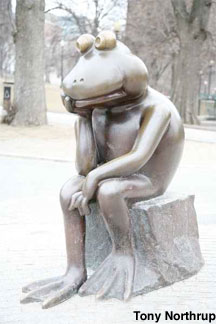
There is a long standing tradition of voluntary silence in religious orders the world over. Silence is golden, so goes the saying; it teaches self-discipline and forces the individual to think and reflect. It’s believed that silence stimulates other senses that are often dulled by the ego’s eagerness to shoot its mouth so to speak. There are orders of trappist monks who spend their days singing hymns and reciting prayers and refrain from casual conversation except when given permission by their superiors. There are orders of nuns who having taken a vow of silence communicate mostly in a special sign language. By eliminating the unnecessary, they seek the essential. By looking past the clutter, they search for the “kernel of truth.”
The world of nuns and monks and sufies seems light years away from the one we dabble in – a world surrounded as it were with walls of sound, image and text. But the constant obsession with “communication” seems to mask more often than not a hollow centre. The cellphone chatter on the bus (typical conversation: “I’m on the bus… Just passed 49th… will be there in 5 minutes… I’m getting off the bus now…I can see you by the door… Yeah, that’s me tapping you on the shoulder”), the MP3 player permanently implanted in the ear and complimented by its ever present buzz, the promiscuous typing on the Blackberry keyboard. What is it all about? Why the urge to constantly communicate? Is it an existential angst? The cogito of the telecommunication age, I chatter, therefore I am?
This constant need to sound off is nowhere more evident that on the Internet with its seemingly infinite number of blogs and its free flowing comments, and more comments, and more comments, mostly by semi-literate blowhards on ego trips. The recycled, pre-digested stuff that passes as content creates a deafening echo chamber. Like democracy, on which the early utopian vanguards of the Interner modeled their packet-switched network, the Internet offers an illusion of choice where one often doesn’t exist. Again like democracy where the presupposition is the existence of an informed critical public, the Internet’s great promise is predicated on an informed free agent public.
Don’t get me wrong; having lived under both systems, I can tell you with absolute certainty that democracy under any circumstances is preferable to dictatorship. But I also know, from experience, that one difference between the two systems is that under dictatorship you know you are being screwed so to speak and therefore develop an inherent distrust of the information you receive; whereas under democracy the tentacles of control are not so obvious.
Most of us, the writer here included, do not have direct access to truth. To quote the late Edward Said, perhaps only children and mad people enjoy such a privilege. We all receive the “truth” through veils of interpretation. Information is produced through a complex system of gathering and editing, and is passed through sieves of bias and self-interest. Even scientific truth that is supposedly objective, is predicated on a system of a priori ideas and assumptions.
The context-sensitivity of truth is what should propel us to read, listen and think. Instead the Internet is replete with grandstanding intellectual promiscuity and verbal diarrhea. Like impetuous children, everyone is throwing tantrums and “expressing” themselves not knowing that they are merely so many organ grinder’s monkeys whose strings are being pulled by a small group of ideologues and demagogues.
Perusing through reams of obscenity-laced grandstanding, one can only hope that there is a silent majority that reads discriminately and carefully, and reflects. To put it simply, think before opening your mouth, and if you’re passionate about something and want to let the world know about it then a little wildness in your tone is fine. To quote Keynes, “words ought to be a little wild, for they are the assaults of thoughts on the unthinking.” But only after a little thinking.






